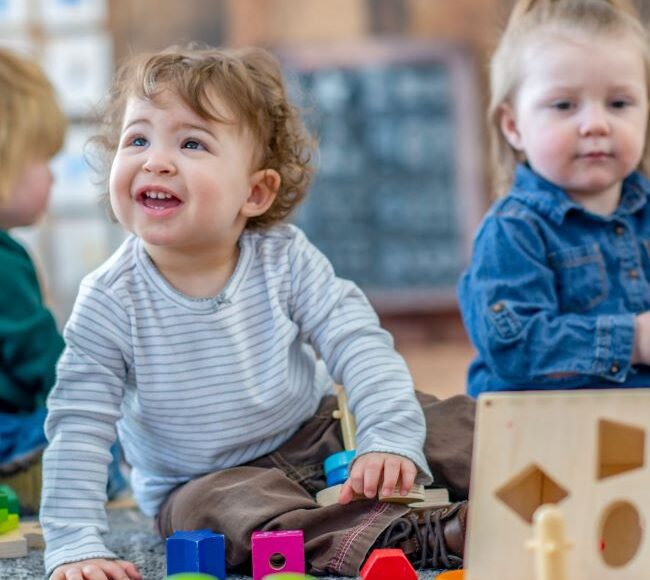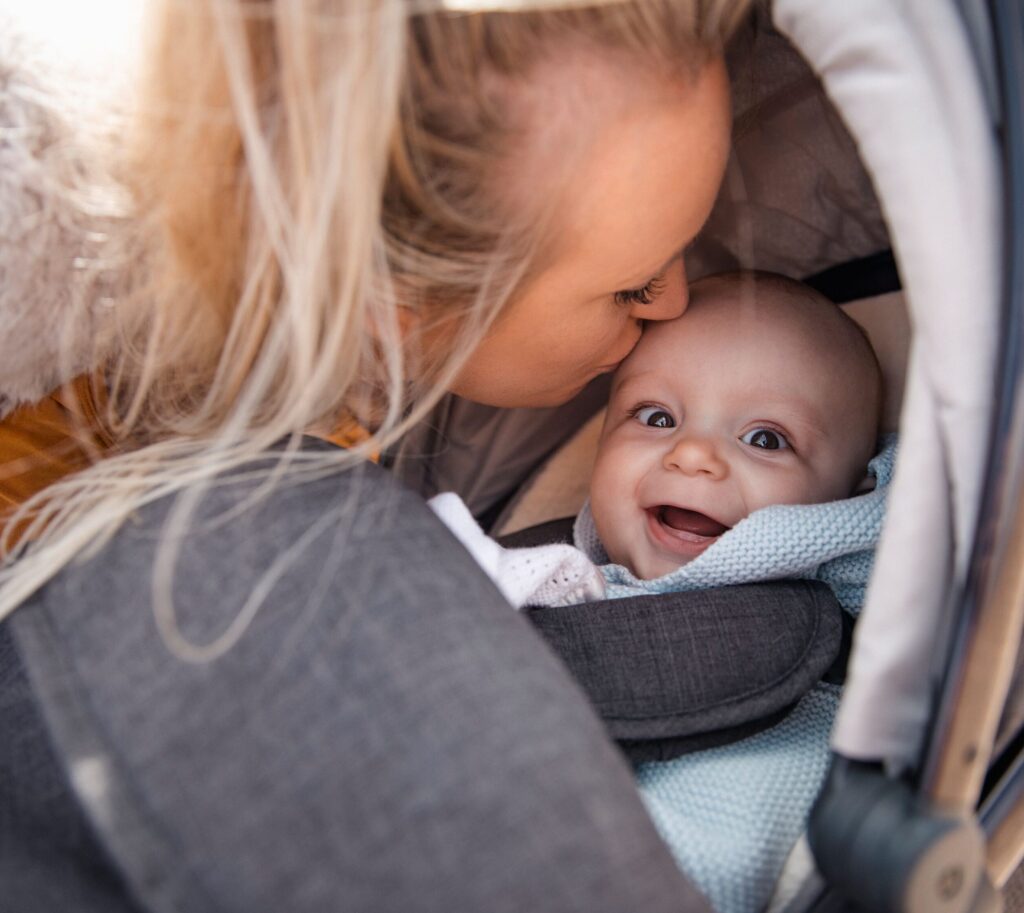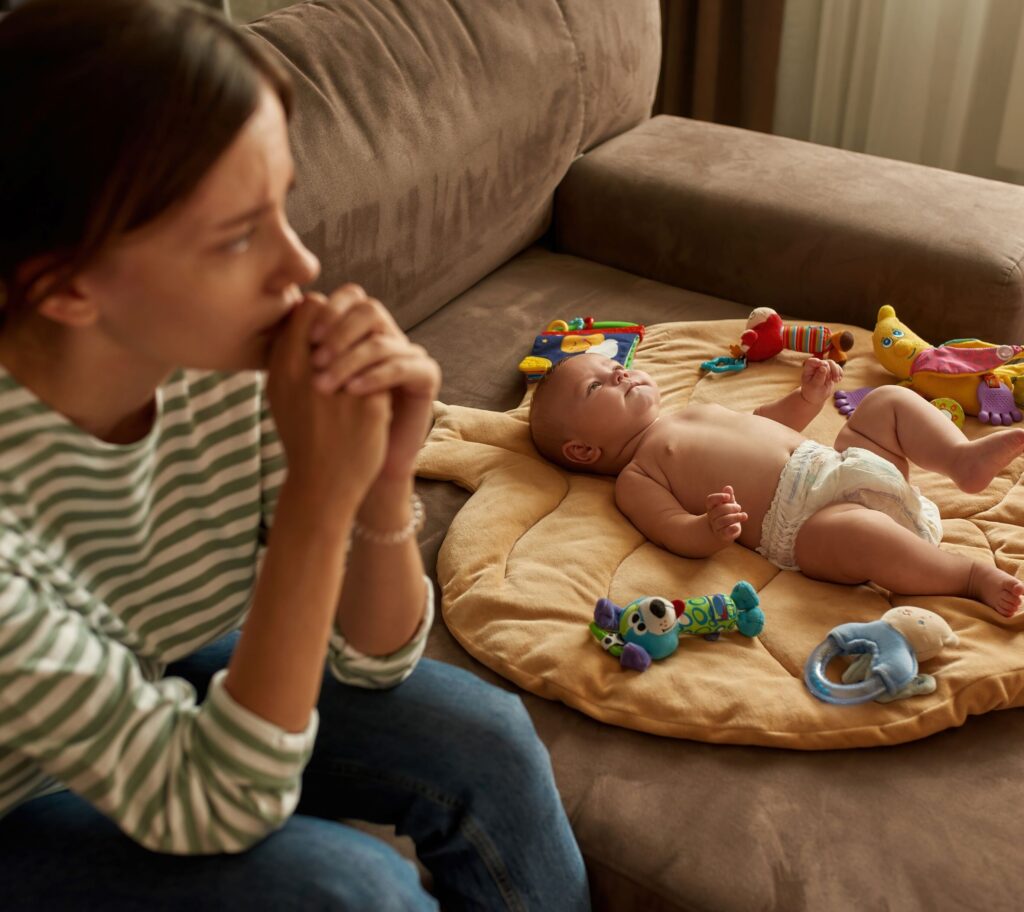Play is essential to the development of healthy, happy children and, consequently, adults. It develops children’s curiosity, creativity, and confidence and strengthens their bodies, minds and resilience, setting them up to thrive. And play doesn’t just help with children’s development – it’s also beneficial for family bonding and wellbeing.
Our Early Years manager Karen says: “You can’t underestimate the power of play… but that power is only unlocked when we don’t try to turn play into work and instead recognise children’s instinctive curiosity and playfulness”.
Our children are hard-wired to be fascinated by the world around them, and the early years are an important period for a child’s physical, cognitive, social and emotional development. Play is a fantastic tool to support your child’s early development, so let’s explore how.
Physical development
Outdoor play in nature, or with mud or sand is fantastic for children’s physical development. They get much-needed exercise, and all that running, jumping and handling squishy mud and sand is great for developing gross motor skills. This helps their balance and coordination.
The more precise movements children might make with scissors, tape or knives used for making things or imaginative food play help to develop fine motor skills. These set the foundation for writing when our children start school.
Play doesn’t need any special equipment: everyday, low cost and, ideally, natural items are perfect. Ideas that cost nothing and need minimal resources include:
- kicking leaves
- building a den
- playing hide and seek
- finding 10 brown/small/shiny objects (the only limit to this one is the number of adjectives you can think of!)
- making a picture with pebbles
- making stone stacks
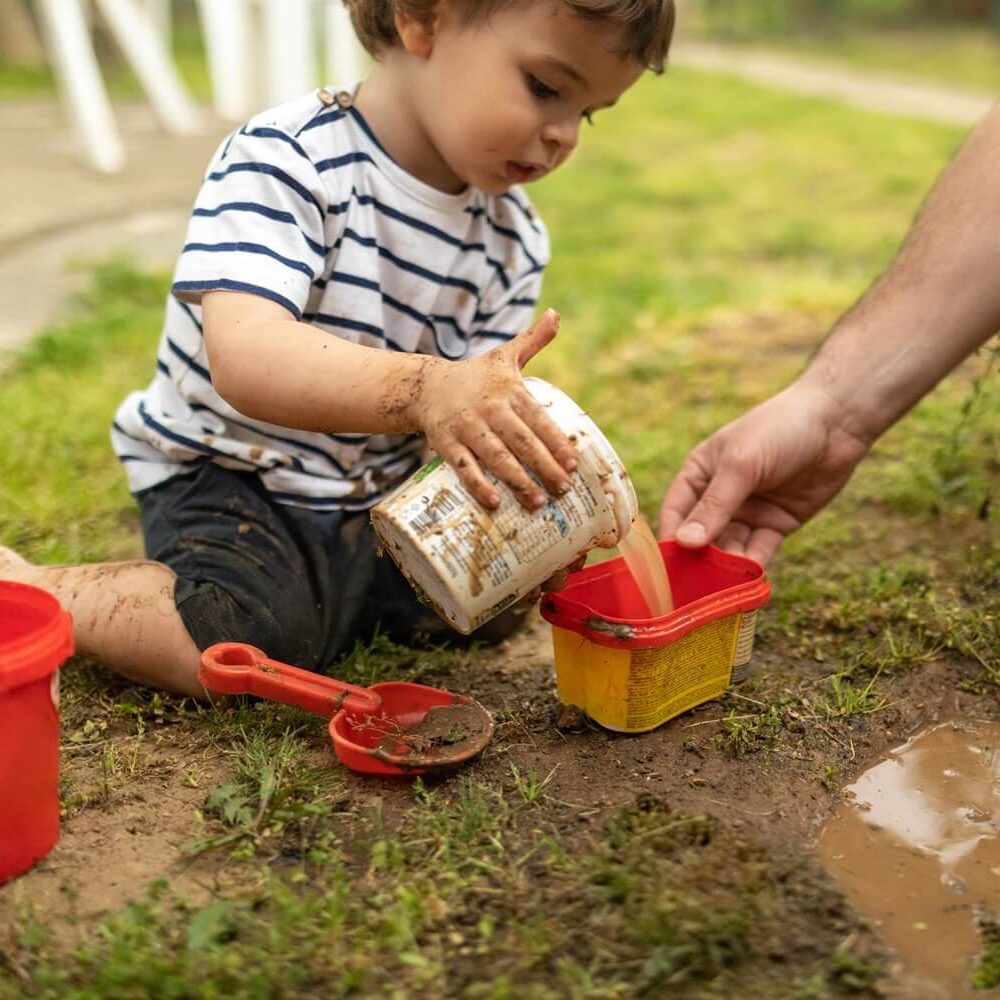
Cognitive development
When you sit down with a pre-schooler at a water play table or a sandpit and help them measure out their play materials in smaller increments, did you realise you’re actually kick-starting their maths education? You’re helping them start learning about weights and measures, and the properties of different materials too. For instance, paper might float until it gets too wet and begins to sink, while plastic will float all day.
Food play can also be a brilliant way to introduce basic numeracy as you weigh out ingredients. And if you read the recipe out loud with an older child, you’re also helping their developing literacy skills.
Any discussions around items, objects and stories help children to understand sentence construction and develop their vocabulary. As Early Years manager Karen notes, “Commenting on what our children are doing and maybe offering some new vocabulary as they do so is a way for children to very quickly learn new words in their proper context.”
Social development
Vocabulary isn’t the only reason to roll your sleeves up and get stuck in alongside your child. Play also lets us explore the difficult world of social interaction in a safe space with fewer consequences.
There are lots of different ways to reach milestones in early childhood but play is really the only way that’s universal. It’s a time that children can really be free. There’s no right or wrong way to play, and they can experience the world in a worry-free way.
For example, children can explore cause and effect as they destroy a tower of blocks. If that tower belonged to another child (or an enthusiastic parent), they can learn how their actions affect others and the consequences of that. It’s also important that children learn to share, as their social interactions become more complex.
Cognitive play and social play can also come together beautifully as children and adults have make-believe play sessions and tell stories together, developing imaginative and creative skills.
Emotional development
Play also has a part in children’s emotional development. On a basic level the sensory elements of water and mud play or modelling dough gives children the opportunity to soothe themselves and relax.
However, play also allows children to experience a full range of emotions – whether that’s the excitement of a new activity, the frustration of failure, the sadness of another child failing to share, or the contentment of creating something themselves.
Play is simply the way children learn. It gives them time to try out strategies and emotions, revisit them and then keep trying them out in different ways.
Karen adds: “Through doing that our children explore lots of different concepts. They learn what works, they find what doesn’t work and they get the time to tweak it until it’s working for them.”
By allowing children to invent situations that enable them to experience difficult emotions such as fear, sadness, anger and disgust, play also gives children the opportunity to explore reactions and consequences – so those poo jokes they keep making are fine, honestly!
The important role we play as parents and carers
It’s important to know when to step back and let the experts – the children themselves – take charge. We believe play should be child-led, but also know that parents, carers and extended family members play an important role in a child’s playtime. Even the smallest things, like making silly faces and blowing raspberries with babies make a difference – for babies especially, it’s the time spent together that counts.
Helping to enable self-led play and gentle, responsive interaction while a child plays can be hugely beneficial to their development and overall wellbeing. However, parents and carers have told us that they can find it a challenge to play with their children – whether that’s due to a lack of time, know-how, motivation or pressure to ‘get it right’.
It’s all about getting down to their level and taking all your distractions away. No mobile phone, no work. Even if it’s only 20 minutes… It’s about true time, not a long time.
Don’t stand above your child, get down to their level and mimic their actions. Follow what they’re doing and show that you’re interested, and in doing this, you’ll increase your child’s confidence.
Our Early Years Manager Karen highlights that, in some cases, the awkwardness some adults feel has been learnt from their parents or carers and breaking this cycle is the only way to help their children experience all the benefits of play.
She said: “A lot of parents haven’t had the experience of being free and exploring the “worst-case scenarios” that occur in play (which are never that bad). If they don’t have those experiences, they can lack that innate sense of wonder and awe that’s so important, so they need to be brave and break that cycle so their child can have the experiences they might never have had.”
Day to day children follow our lead but during play it’s the one time they can do what they want. It’s important to allow them to experiment with influencing their own world so they can learn about cause and effect.
At the moment my daughter likes those really cute-looking dolls with the big eyes… by which I mean I set up them up in a line and she smashes into them! But it doesn’t bother me in the slightest as I work in an education setting and I know it’s important to be led by your child and their creativity.
Becoming comfortable with mess
Modelling dough, water play, nature, food, mud… They all involve things that ooze, stain and squelch. Because these materials are flexible, they allow children to exercise their creativity in a way that isn’t possible with more rigid toys made of metal or plastic. This lets them make shapes, mounds or even huge messes that they’ve defined themselves.
Messy play allows our children to learn about different sensory experiences – including those that allow them to soothe themselves. It also allows children to explore cause and effect and their own impact on the world around them in a very low consequence way.
Here are some ways to cut down on the amount of clean-up required:
- Consider doing water play in the bath or sink. At the end, you can simply pull the plug.
- Put down a large sheet or tarpaulin on the floor. (Top tip – this is a great way to gather up LEGO.)
- If you have any, roll out some old wallpaper for them to sit and draw on.
- Water painting is a great way to encourage mess with zero consequences. On warm days you can use water to “paint” on walls and the ground and then watch as, magically, it evaporates and disappears.
- Make the clean-up part of the game! This takes a little bit of good selling on the part of the grown-up, but children can be convinced to race to pack things away and clean up if you’re enthusiastic enough about it.
- Go to the park or out in the garden – then it doesn’t matter how much mess they make. Just make sure there’s a change of clothes handy when you get home!
Feeling more relaxed about risk
It might feel unintuitive but risk is important to allow children to develop the skills they need to survive in the world. It’s a bit like learning to swim – most parents don’t like the feeling of letting go as their child enters the pool for their first swimming lesson, and it can be fraught with worry.
Though lessons can be stressful, you wouldn’t want to risk your child not being able to swim the first time they encountered deep water. It’s the same with risk in play – our children are learning to navigate the world around them in a safe, supervised space, and developing their confidence and resilience as they do so.
Parent Leanne is employed in a nursery and says her job helps her feel more comfortable about risk. “Children need to find their feet and understand what’s dangerous so they naturally know when to stop when they’re older, and it’s better for them to find out and explore risk under your supervision.”
She added: “My son, for example, would always climb a tree much higher than my daughter would, and always be able to come back down, while my daughter wouldn’t go more than two branches. They have the ability to judge for themselves and, if you’re not careful, you can make them nervous because of your nervousness… But it is yours, and not theirs.”
It’s not easy, but here are some ways to safely allow some risk during playtime:
- Children will naturally want to try and navigate stairs themselves from around nine months. When they do, let them have as much freedom as you can. You can always hover just in front ready to catch them should they put a foot wrong.
- Consider using real crockery in imaginative play, and avoid plastic plates once children are at pre-school age. Yes, some will get broken, but it’s a great opportunity to teach children about cause and effect.
- When you’re doing play involving food with pre-school age children, let them chop soft fruit or vegetables like banana or cucumber using a child-safe knife. It’s very difficult to cut yourself with one of these knives, but it raises the stakes enough that children will develop their focus and fine motor skills.
One of the most important aspects of risk is risk assessment, so be sure to talk to your children about what they’re planning and what might be required to be safe. For example, you might ask a child who is trying to climb to a higher surface by stacking boxes how high it can get without it becoming unsafe. Talk it through with them so they can identify their own risk.
Making time for play
Finding time for play around responsibilities like work, household tasks, life admin and social and family commitments is a big ask. Here are some ideas to help you do this and also make everyday tasks more fun:
Housework
There’s nothing wrong with making a game out of putting away the dishes, baking together or hanging out the washing. Other activities children enjoy are sweeping and polishing, hoovering and washing up (which is essentially a form of water play).
You can also try giving them play items related to what you’re doing at the time – for example, giving them a bowl of flour and water to mix as you bake or wash up.
My daughter Daisy loves helping me with the housework as the very act of doing it together makes it fun… She particularly likes chopping vegetables for me but even sorting the socks can be play! Anything can really.
Essential trips out
Any environment can be a play environment. In many ways getting out into different environments helps encourage children to be as imaginative as possible. It may help to pack a bag of small toys and objects – extra points if you get your child a backpack so they can carry it themselves.
Other good “out and about games” are the classic “I Spy” or the less well-known “ice cream and jelly”. This is where you take turns saying this simple phrase in an interesting way – such as whispering or singing – and the other has to copy it.
Keep a list
Keep a list on your phone of any activities your children want to do so that when you do have time for play you don’t have to think too hard about what to do together. Instead you can say, for example, “Remember you said you want to go and feed the ducks?”
Try not to be too hard on yourself about how much time you have to play, as often in the modern world things are beyond your control. Remember that the messages we see on social media are, by their nature, the bits other parents chose to share, and you can only make the best of the time and resources you have. What children really crave is the attention and love of their parents, so spending time together is more important than organising the perfect play session.
The role of play: what it’s all about
While we know play is vital for learning, development and family bonding, it has an even greater function – that of creating happiness. We know happy children learn more because they’re eager to spend time at pre-school with their friends and the staff there.
But it’s not just about learning. If we’re honest, what most of us would want for the children we work with, and our own children, is for them to have happy, fulfilled lives.
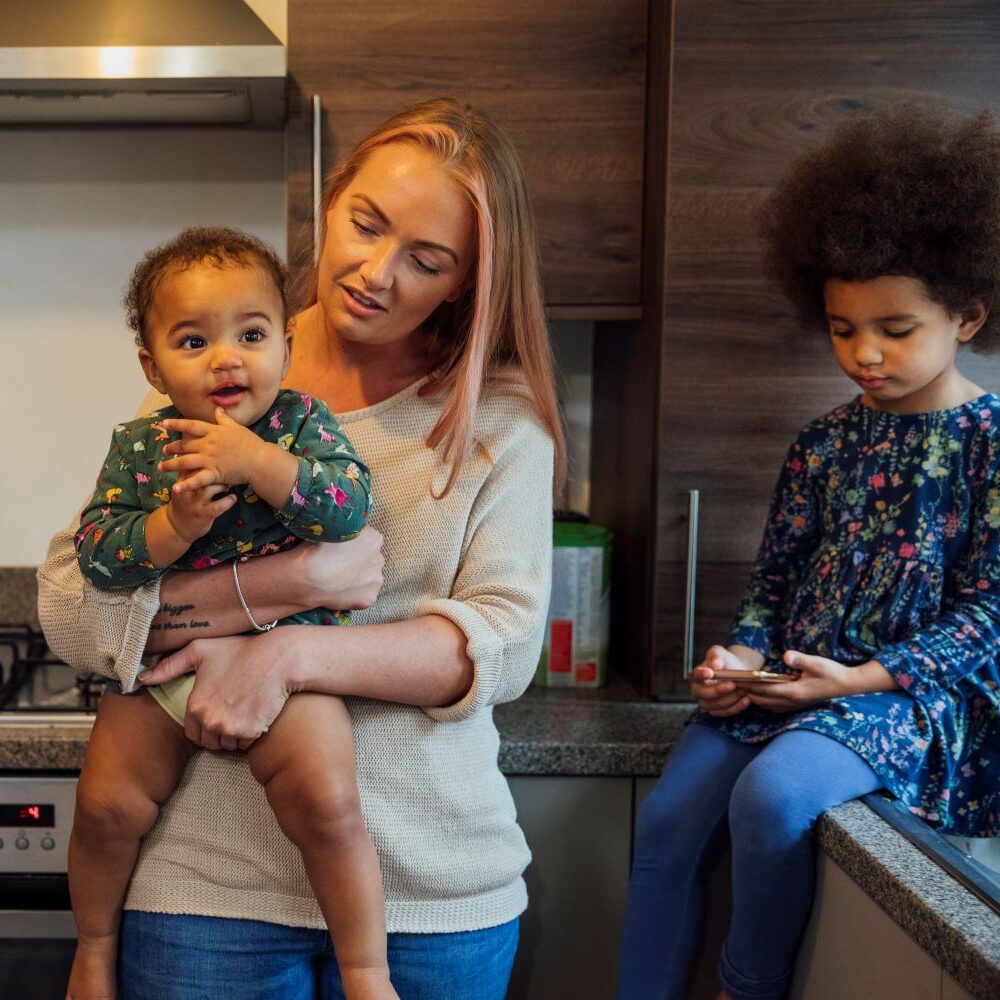
Call, text, email or web chat FamilyLine
If you’re feeling overwhelmed, worried or upset about any aspect of your family life, FamilyLine is here for you. We offer free emotional support and guidance on family relationships, conflict, parenting, caring, financial worries and more.
Contact FamilyLine

